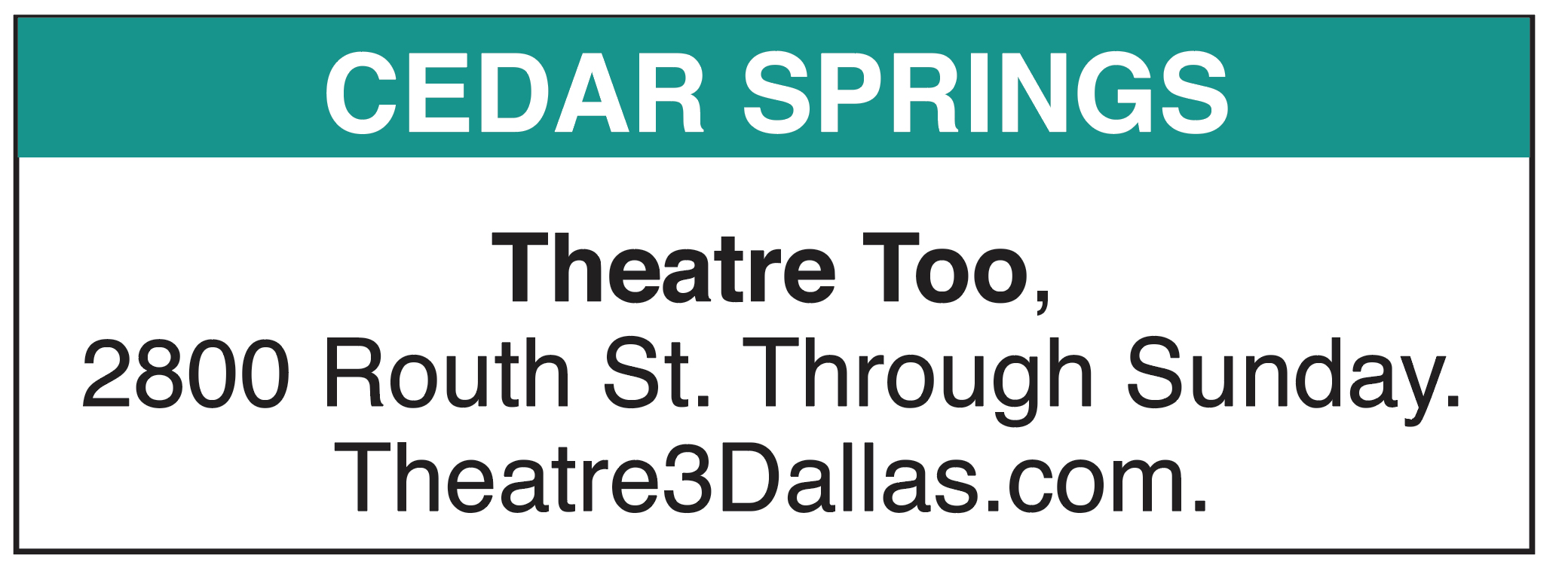Don (John S. Davies, left) and Rhonda (Charlotte Akin, right) dine with Clark (Chad Cline) and his husband in the hilarious ‘Cedar Springs or Big Scary Animals.’ (Photo by Jeffrey Schmidt)
‘Cedar Springs’ laughs through tears
ARNOLD WAYNE JONES | Executive Editor
jones@dallasvoice.com
 Rhonda (Charlotte Akin) and Don (John S. Davies), older white Republican Baptists, are having an awkward dinner with their new neighbors, an interracial gay couple: Marcus (Wilbur Penn) and Clark (Chad Cline). As you might expect — and as they all no doubt did — the dessert course is served as cold as the hospitality. Clark and Rhonda seem to get along OK, but Marcus sees insults in every question, and Don spends more time with a foot in his mouth than a four-month-old. They are from separate worlds, thrown together by circumstance — Rhonda and Don moved from the backwoods of East Texas and settled unknowingly in the gayborhood. But, in the best tradition of situation comedy, such a conflict of cultures can be the source of a lot of humor.
Rhonda (Charlotte Akin) and Don (John S. Davies), older white Republican Baptists, are having an awkward dinner with their new neighbors, an interracial gay couple: Marcus (Wilbur Penn) and Clark (Chad Cline). As you might expect — and as they all no doubt did — the dessert course is served as cold as the hospitality. Clark and Rhonda seem to get along OK, but Marcus sees insults in every question, and Don spends more time with a foot in his mouth than a four-month-old. They are from separate worlds, thrown together by circumstance — Rhonda and Don moved from the backwoods of East Texas and settled unknowingly in the gayborhood. But, in the best tradition of situation comedy, such a conflict of cultures can be the source of a lot of humor.
A theme of Matt Lyle’s Cedar Springs or Big Scary Animals, which ends its run at Theatre Too this weekend, is that we all have something to learn from each other, no matter how different.
I’m not sure I agree, but we’ll get to that.
Almost every gay adult has had a tense meal with bigoted conservatives who languish in a fog of ignorance and bible-thumping judgment — we call it Thanksgiving. (I kid, I kid… sort of.) But an almost equal number have no doubt encountered people who, despite all assumptions to the contrary, aren’t as bad as expected. There are two miserable, judgmental, unpleasant narcissists in Cedar Springs … but they aren’t who you think.
Lyle is one of Dallas’ most subversively funny playwrights, mining humor from dark and unusual places (worldwide apocalypse; online dating by mad scientists). The set-up of Cedar Springs isn’t far from the second act of La Cage aux Folles, but Lyle breathes a fresh, contemporary and highly localized spin on it.
One of the deceptive twists of the play is who we end up identifying with. Rhonda and Don sound like they might be Trump voters, but at least they are trying. (“We’re the best kind of people — Christians!” Rhonda cheerily asserts.) Marcus, on the other hand — and his adopted 19-year-old daughter Sophia (Alle Mims) — don’t have the same excuses. Marcus is professorial, prickly, defensive. When Don asks if Sophia’s parents were drug-addicted criminals, Marcus all but recites Martin Luther King’s “I Have a Dream” speech to him for making such stereotypical assumptions … but he doesn’t deny it. He’s like the living embodiment of David Sedaris’ short story “Glen’s Homophobia Newsletter” — a man who assumes the worst in everyone and breeds suspicion… except when he’s being a pedantic and insufferable smartypants. (He’s matched by Sophia, an activist and college student who thinks confrontation equates with conversation, accusation substitutes for discussion, honesty trumps manners, and mockery can only be one-sided. In short, she’s a spoilt teenager.) He got pain, Effie White might say; he is pain, too.
There are many, many hilarious moments in this provocative piece, and most of those are owned by Cline. He’s the flamboyant one in the dyad, a cuddly nurturer with a quick wit and disarming smile. It’s a delightful performance.
Akin and Davies are nearly as good — Davies especially in a late-act monologue that is one of several sincerely emotional moments. Jaxon Beeson (as Rhonda and Don’s home-schooled son) and even Mims do well, too, but Penn flubs a number of lines, and his character feels a bit too impenetrable.
David Walsh’s bifurcated set splits the action down the middle of the tight Theatre Too black box, which leads to an ungainly imbalance of the action, but something else more than makes up for it: The audience. The performance I saw was nearly filled, and this smart, 85-minute comedy created a sense of community that is, at its heart, the goal of all theater (and, to be blunt, rarely achieved). In the restroom after the performance, I overheard a patron observe, “Why do small theaters do such better work than many of the bigger ones?” I wanted to tell him the answer: Heart, risk and respect for intelligence. Community is what brings gays to Cedar Springs… and what should bring audiences to Cedar Springs.
This article appeared in the Dallas Voice print edition September 29, 2017.











